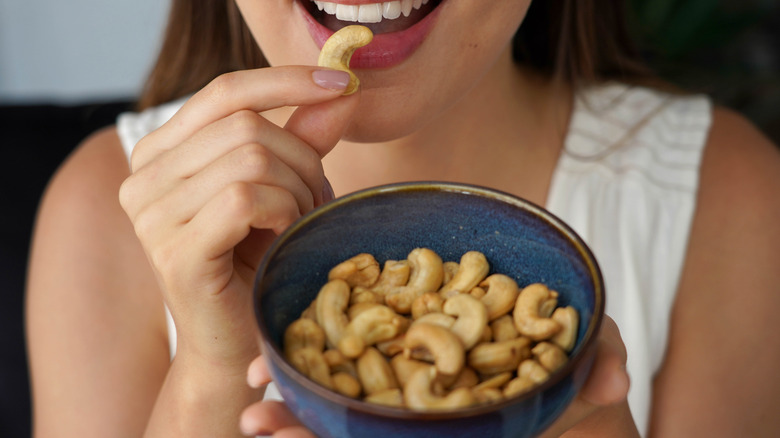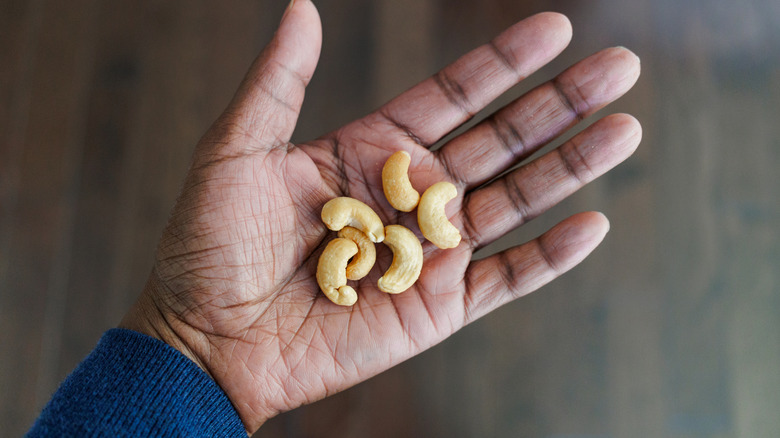
Eating Cashews Has An Unexpected Effect On Your Teeth – Health Digest
Since you were a kid, your dentist probably told you to cut back on sweets and sugary drinks to prevent tooth cavities. While sugar itself doesn’t directly cause cavities, it does contribute to them. The bacteria in your mouth feed on sugars and produce acids as a byproduct. These acids, along with the bacteria and food particles, form a sticky biofilm called plaque that clings to your teeth.
Over time, plaque can erode your tooth enamel and lead to cavities. Brushing, flossing, and regular dental visits help prevent this buildup, but your saliva also plays a major role. It works around the clock to neutralize acids, wash away food debris, and support minor enamel repair.
Enter cashews. When you pop a few into your mouth, the extra chewing stimulates saliva production, which helps rinse away food particles and neutralize acids. Cashews also provide a gentle massage for your gums to help dislodge debris between your teeth. Cashews may even help neutralize the bacteria in your mouth responsible for tooth decay and cavities.
The dental benefits of cashews
Cashews contain certain compounds that may support dental health. In a 2014 article published in Brazilian Research in Pediatric Dentistry and Integrated Clinic, researchers tested tannins from cashew bark in the lab to see how they affected bacteria that can harm your teeth. The tannins not only stopped the bacteria from growing but also prevented them from sticking to surfaces. They also killed these bacteria. The researchers compared the antibacterial power of cashew tannins to chlorhexidine, a common ingredient in many mouthwashes and toothpastes. While chlorhexidine was more effective, the cashew tannins still held their own against this synthetic dental additive.
Of course, you don’t typically snack on cashew bark — you snack on the cashew nuts. Chewing on cashew nuts can offset some of the acid damage that sugar can cause. A 2016 study in the American Journal of Dentistry found that after people rinsed with sugar water, the acidity in their mouths increased. But when they ate nuts or seeds about 10 minutes later, their mouth pH returned to healthier levels more quickly, helping reduce the potential damage caused by sugar.
The health benefits of cashews
Cashews are healthy for you beyond just dental health. An ounce of raw cashews (28 grams) contains more than 6 grams of monounsaturated fats and 2 grams of polyunsaturated fats, both of which are great for your heart. The oleic acid in cashews helps lower bad LDL cholesterol while boosting good HDL cholesterol. Eating cashews more than four times a week has been linked to up to a 37% reduced risk of heart disease, according to a 2020 review in the Journal of Pharmaceutical Quality Assurance and Quality Control.
Cashews are also good sources of iron, magnesium, copper, and zinc. The magnesium and copper help relax your nerves, which can prevent migraines and muscle cramps. These minerals also support cognitive function and protect your brain from fatigue. Magnesium may improve insulin sensitivity, reducing your risk of type 2 diabetes. Just one ounce of cashews provides 6.2 micrograms of lutein and zeaxanthin to help protect your eyes from light damage and lower the risk of age-related macular degeneration.
Although cashews aren’t considered a “complete protein,” they do contain all essential amino acids to support your muscles and other tissues. You’ll also find plenty of proanthocyanidins, which are powerful antioxidants that may help stop cancer cells from spreading. The 157 calories in a small handful of cashews might seem like a lot, but the fiber and healthy fats can help you feel full and manage your weight.





